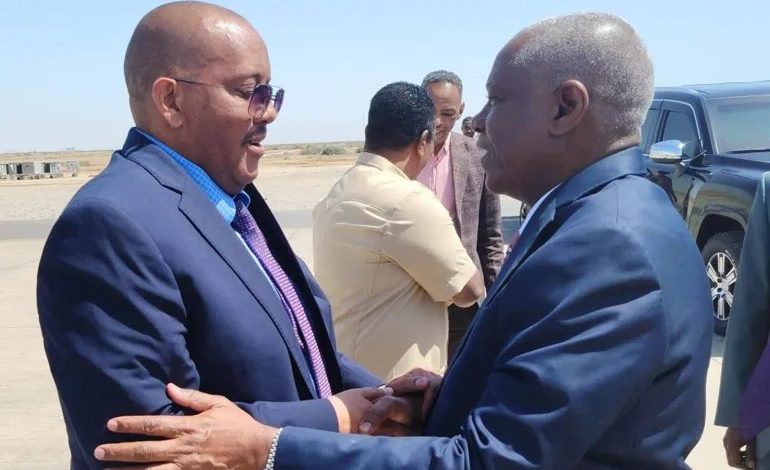Why Is the Visit of the Ethiopian Intelligence Chief to Sudan Drawing Significant Attention?

Report by: Al-Nour Ahmed Al-Nour
Official Sudanese sources revealed to Al Jazeera Net that Ethiopian intelligence chief Redwan Hussein visited Port Sudan—the country’s temporary administrative capital—on Monday, carrying several important files. The visit is seen as a new phase in the relationship between the two countries following a period of stagnation.
Unlike typical intelligence visits, this one took place under the spotlight. Hussein held talks with his Sudanese counterpart, Ahmed Ibrahim Mufaddal, discussing ways to enhance security cooperation between the two nations, including intelligence sharing and mutual experiences for the benefit of shared interests.
Hussein also delivered a message from Ethiopian Prime Minister Abiy Ahmed to Sudan’s Sovereign Council President Abdel Fattah al-Burhan, emphasizing the importance of supporting Sudan’s efforts to restore peace and stability amid ongoing challenges.
Following the meeting, Hussein affirmed Ethiopia’s firm commitment to helping Sudan overcome its crises, expressing Ethiopia’s readiness to share its experiences in peacebuilding and managing diversity, contributing to Sudan’s stability and preserving its national unity.
Resumption After Stagnation
Previously, Ethiopian Prime Minister Abiy Ahmed visited Port Sudan in July 2024, marking the first visit by an African leader since war broke out in Sudan between the Sudanese Armed Forces and the Rapid Support Forces in April 2023.
Ahmed’s primary aim was to mediate tensions between Khartoum and Abu Dhabi. He succeeded in arranging a phone call between al-Burhan and UAE President Sheikh Mohammed bin Zayed to help resolve disputes. However, this effort fell short of a breakthrough, according to al-Burhan’s remarks to Sudanese and Egyptian journalists in August.
That visit helped thaw relations between Sudanese and Ethiopian leadership, following Abiy Ahmed’s earlier controversial remarks during the initial weeks of the war. At the time, he claimed Sudan was facing a constitutional vacuum and called for East African forces to be deployed between the warring factions—an idea strongly rejected by Sudanese authorities.
In November, former Sudanese Foreign Minister Ali Youssef Al-Sharif visited Addis Ababa and met his Ethiopian counterpart, Gedu Andargachew, days after Ethiopia’s Foreign Ministry summoned Sudan’s ambassador, El-Zein Ibrahim, to protest Al-Sharif’s threat of war if no agreement was reached over Nile waters between Sudan, Egypt, and Ethiopia.
Sudanese government-aligned media have previously criticized Ethiopia for hosting leaders of the Rapid Support Forces and the opposition Democratic Civil Forces Coalition (Taqaddum), accusing it of allowing anti-Sudanese activities on its soil.
Shifting Positions
Sources close to the Sudanese Sovereign Council told Al Jazeera Net that Hussein’s visit covered various bilateral and regional issues, particularly in the Horn of Africa, resulting in agreements following earlier communication and a visit by Sudan’s intelligence chief to Addis Ababa. That earlier visit reportedly “cleared up many misunderstandings and corrected the perception of Sudan’s situation.”
The same sources confirmed both parties committed to preventing hostile activities from either country against the other and to working together to promote stability along their shared border. This includes trade cooperation, freedom of movement for citizens, preventing destabilizing actions, and coordinated responses to developments in the Horn of Africa.
Accompanying Hussein was former Tigray regional governor Getachew Reda, recently appointed as the Ethiopian Prime Minister’s advisor on African affairs. This marks his first official overseas visit since being appointed on April 11. He previously headed Tigray’s interim administration.
The Ethiopian delegation’s visit coincided with new Sudanese Prime Minister Kamil Idris officially assuming office.
Meanwhile, tensions are rising between Ethiopia and Eritrea. Ethiopian media—which covered Hussein’s visit extensively—highlighted the significant challenges currently facing the Horn of Africa.
According to official sources, Ethiopia—host of the African Union’s headquarters—has promised to play a positive role in lifting the suspension of Sudan’s AU membership. It is also expected that Idris’ upcoming African visits, which he mentioned in his first speech from Addis Ababa, will address this issue.
Regional Crossroads
Mohamed Hamid Jumaa, a writer and expert on Sudanese-Ethiopian relations, noted that Redwan Hussein is the highest-ranking Ethiopian official to visit Sudan since Abiy Ahmed’s visit to Port Sudan nearly a year ago. The only other notable contact was Al-Sharif’s visit to Addis Ababa, which only involved meeting his counterpart.
Jumaa told Al Jazeera Net that intelligence and security visits are usually confidential, but Hussein’s visit attracted widespread media attention—particularly in Ethiopia—highlighting the official messages he delivered to Sudanese leadership. This, he noted, signals Ethiopia’s intention to send a clear message to both domestic and international audiences.
He explained that Ethiopia feels increasingly threatened by escalating tensions with Eritrea and by Eritrea’s alliance with a Tigrayan faction opposed to the Pretoria Agreement—a peace deal between Addis Ababa and the Tigray region. Given the geographical and political interconnections, Sudan is not far removed from this conflict due to its shared borders and links with various parties, including Eritrea.
What stood out, according to the expert, were the positive remarks made by Ethiopia’s African affairs advisor regarding the repatriation of large numbers of Ethiopians who were residing illegally in Sudan. This development has been welcomed in Ethiopia, as it aligns with terms in the Pretoria Agreement related to the return of refugees who have been caught in the region’s internal power struggles.
Jumaa believes it is in both nations’ interest to pursue positive engagement and mutual security and political cooperation, even though this may clash with complex alliances—Ethiopia’s ties with certain Arab powers and Sudan’s alignment with Egypt. However, he says these can be managed if each country respects the other’s strategic interests and avoids letting regional alliances derail bilateral relations.
He concludes that the signals sent through Hussein’s visit suggest a shift in Ethiopia’s stance toward supporting Sudan’s position and the new government under Kamil Idris. Addis Ababa fears that continued war in Sudan and the emergence of a separatist entity could embolden secessionist movements within Ethiopia.



